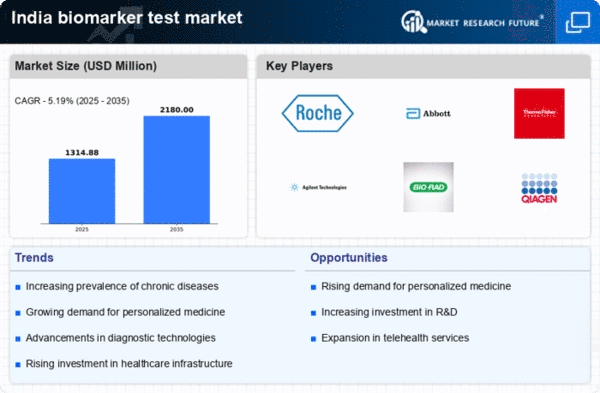Government Initiatives and Funding
Government initiatives aimed at enhancing healthcare infrastructure and promoting research in India are significantly influencing the biomarker test market. The Indian government has allocated substantial funding for healthcare research, which includes the development of biomarker tests. For instance, the National Health Mission and various state-level programs are designed to improve diagnostic capabilities across the country. This financial support is likely to foster innovation within the biomarker test market, encouraging collaborations between public and private sectors. Additionally, the establishment of research grants and incentives for biotech firms may lead to the introduction of novel biomarker tests, further propelling market expansion. As a result, the biomarker test market is poised for growth, driven by these supportive governmental policies.
Rising Investment in Biotechnology
The increasing investment in biotechnology is a significant driver for the biomarker test market in India. Venture capital and private equity firms are increasingly funding biotech startups focused on developing innovative biomarker tests. This influx of capital is likely to accelerate research and development efforts, leading to the introduction of advanced testing solutions. The biomarker test market stands to benefit from this trend, as new entrants bring fresh ideas and technologies to the market. Moreover, collaborations between academic institutions and biotech companies may foster innovation and enhance the overall quality of biomarker tests. As investment in biotechnology continues to rise, the biomarker test market is expected to expand, driven by a robust pipeline of new products.
Advancements in Diagnostic Technologies
Technological advancements in diagnostic tools are reshaping the biomarker test market in India. Innovations such as next-generation sequencing, liquid biopsy, and high-throughput screening are enhancing the accuracy and efficiency of biomarker tests. These advancements enable healthcare professionals to obtain more precise results, which is crucial for effective patient management. The biomarker test market is likely to experience growth as these technologies become more accessible and affordable. Additionally, the integration of artificial intelligence and machine learning in data analysis is expected to streamline the testing process, further driving market expansion. As diagnostic technologies continue to evolve, the potential for biomarker tests to transform patient care becomes increasingly apparent.
Increasing Prevalence of Chronic Diseases
The rising incidence of chronic diseases in India, such as diabetes, cancer, and cardiovascular disorders, is a primary driver for the biomarker test market. As healthcare providers seek to improve diagnostic accuracy and treatment efficacy, the demand for biomarker tests is expected to surge. Reports indicate that chronic diseases account for approximately 60% of all deaths in India, highlighting the urgent need for effective diagnostic tools. The biomarker test market is likely to benefit from this trend, as healthcare systems increasingly adopt these tests to facilitate early detection and personalized treatment plans. Furthermore, the integration of biomarker testing into routine clinical practice may enhance patient outcomes and reduce healthcare costs, thereby driving market growth.
Growing Awareness of Preventive Healthcare
There is a notable shift towards preventive healthcare in India, which is driving the biomarker test market. As individuals become more health-conscious, the demand for early detection and preventive measures is increasing. Biomarker tests play a crucial role in identifying potential health risks before they develop into serious conditions. The biomarker test market is likely to see growth as healthcare providers promote these tests as part of routine health check-ups. Furthermore, educational campaigns aimed at raising awareness about the benefits of biomarker testing are expected to enhance public understanding and acceptance. This trend may lead to a broader adoption of biomarker tests, ultimately contributing to improved health outcomes and reduced healthcare expenditures.
















